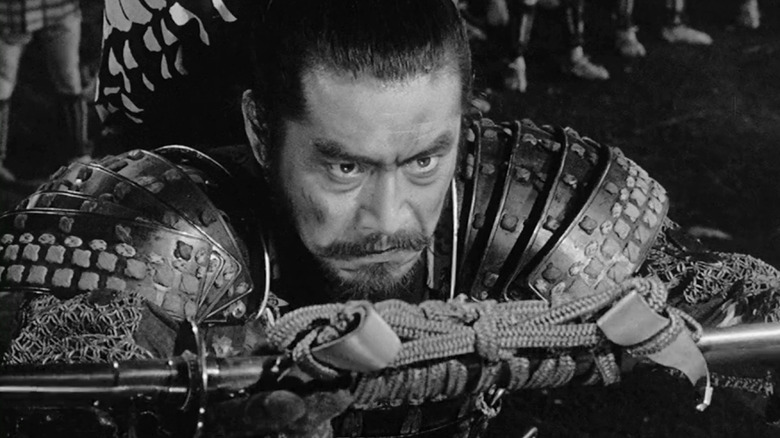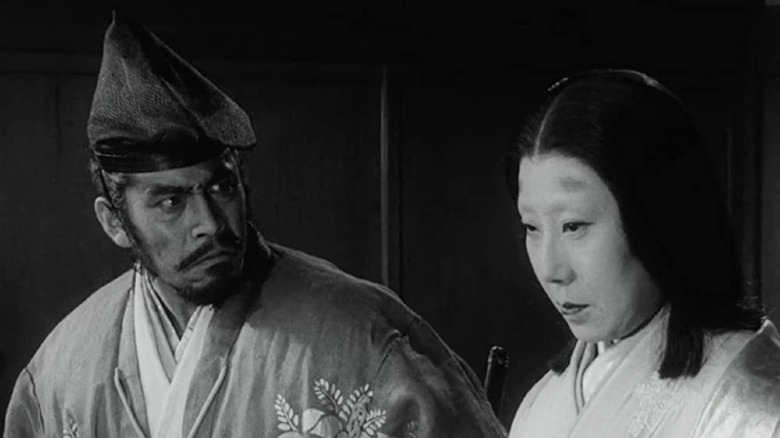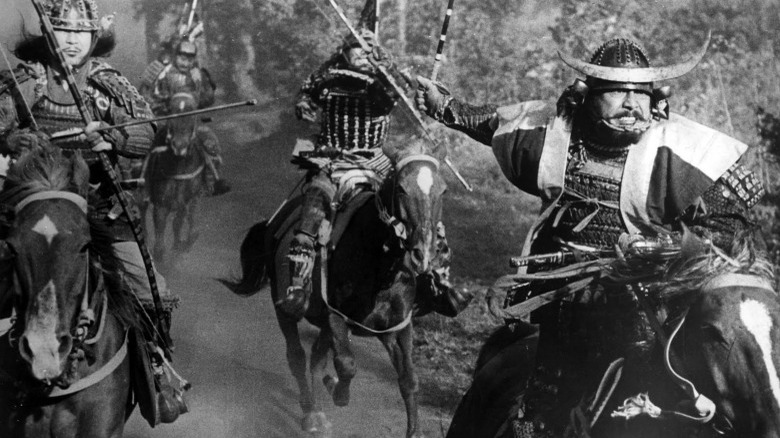The Daily Stream: Throne Of Blood Transforms The Bard's Prose Into Visual Poetry
(Welcome to The Daily Stream, an ongoing series in which the /Film team shares what they've been watching, why it's worth checking out, and where you can stream it.)
The Movie: "Throne of Blood" (1957)
Where You Can Stream It: HBO Max
The Pitch: A warrior returning from battle is told by a mysterious supernatural entity he is destined to rule the realm he defends, leading him down a dark path of betrayal and murder from which there is no escape. Instead of Scottish general Macbeth, the doomed warrior is Taketoki Washizu (Toshiro Mifune), a samurai commander who serves Kuniharu Tsuzuki (Takamaru Sasaki), the current lord of Spider's Web Forest Castle in feudal Japan. And instead of a trio of witches, the supernatural entity is a shape-shifting spirit (Chieko Naniwa) who dwells deep in the labyrinth of tangled tree branches, hidden paths, and fog that is Spider's Web Forest.
Despite these and other changes, director Akira Kurosawa's 1957 classic "Throne of Blood" is faithful to the spirit of William Shakespeare's "Scottish Play," taking its themes about fate, ambition, and gender and transposing them onto a different historical setting with its own cultural influences (like the Japanese theatrical dance-drama art Noh). But what really sets the movie apart from other "Macbeth" adaptations is the way it transforms The Bard's prose into visual poetry.
Why it's essential viewing
Every artist has their own way of adapting Shakespeare. If you're Laurence Olivier, you might keep the camera still and steady for long stretches while you and your co-stars speak The Bard's words aloud. If you're Orson Welles, you may prefer to keep the camera moving as much as, if not more, than you and your fellow actors. Perhaps you would choose to marry static, intimate shots of your cast delivering their lines with hyper-stylized action in the vein of Zack Snyder, as Justin Kurzel did in his "Macbeth" movie. Or you might even stage the "Scottish Play" as a cross between "The Seventh Seal" and a German Expressionist horror film, as Joel Coen did in "The Tragedy of Macbeth."
If you're Kurosawa making "Throne of Blood," however, you drop most of the spoken words from "Macbeth" entirely. The major story beats are all still there, from Washizu's wife, Lady Asaji Washizu (Isuzu Yamada), figuratively whispering in his ear and conspiring with him to take the lordship promised to him by force, to the malicious spirit telling Washizu the only way his reign as lord of the land will end is if something truly bizarre were to happen, like the trees of Spider's Web Forest attacking his castle (Wink!). But even the most famous of lines from The Bard's original play are either paraphrased or, more often than not, excised in Kurosawa's film. The result is a most unorthodox yet profoundly cinematic Shakespeare re-imagining characterized by lengthy stretches of little to no diegetic dialogue at all.
Like an arrow to the neck
In lesser hands, a film that takes the "Shakespeare" out of Shakespeare without replacing his words with equally witty banter or philosophical musings could be a recipe for disaster. But, of course, this is a Kurosawa joint we're talking about, so there's neither an unsightly shot composition nor a visually-boring scene to be found. The movie's desolate landscape is a wind-battered domain of rain and fog, the perfect backdrop for this sordid tale. Quiet, static moments in which characters chill in public or scheme in private are juxtaposed to powerful effect with kinetic images of warriors on horseback galloping through the woods or charging on their own two feet into a conflict.
Mifune's performance in "Throne of Blood" is another crucial aspect of the film's visual storytelling. His eruptive, intense acting is nicely complimented by the restrained approach of the other cast members, much like Kurosawa contrasts prolonged moments of near-silence with dynamic shots and camera wipes. (Let it not be forgotten he also edited the movie on top of directing and co-writing it.) Washizu's passionate displays only grow in ferocity as the story progresses, mirroring the tone and impending sense of doom. The final product is quite electrifying.
If most Shakespeare adaptions (not counting the ones that totally re-imagine his plays in a modern setting) tend to put you to sleep, then "Throne of Blood" will wake you up — like an arrow to the neck.


